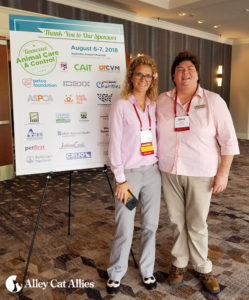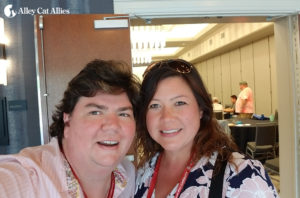Citizens and local officials alike look to animal control officers (ACOs) and shelter staff for their expertise in animals. This gives them a unique platform to lead their communities toward positive change. To save more animals’ lives, ACOs must be on board with humane and effective programs like Trap-Neuter-Return (TNR) and be ready to work with their community to operate them. It’s not just about reducing the numbers of animals euthanized in sheltersit’s also about helping people who are concerned about cats, saving taxpayer money, and improving the lives of individuals and animals in the community. By focusing on these goals, ACOs will see the rewards firsthand, which will increase the fulfillment they get from their work.
These were among the points Alice Burton, Alley Cat Allies’ associate director of Animal Shelter & Animal Control Engagement, laid out at her presentation during the 2018 Tennessee Animal Care and Control Conference in Nashville on August 7. Alley Cat Allies was a Silver Sponsor of the annual conference, which brought together animal control officers, veterinary and shelter professionals, and others working in animal welfare to connect, discuss, and learn from each other.
Burton presented her session, “The Role of ACOs and Feral/Community Cats,” to a full house of ACOs and shelter staff from around the state and beyond. The session walked through everything from the basics of TNR to the vital role ACOs play in saving cats’ lives and rallying their community around TNR. As a former ACO, Burton shared her experience and knowledge that working with citizens will help ACOs to help more animalsand make their jobs easier.
“Who thinks their community is different from everyone else’s?” Burton asked the audience at the session. “The truth is, people may think their community, and its residents, are different from other communities, and that what they want is different, but that’s just not so. All communities have people who want to help their community cats.”
Burton said that what’s best for community cats is the same everywhere: providing TNR and allowing cats to live and thrive in their outdoor homes.
The value of TNR was the biggest takeaway of the session for Thomas W. McCosh, the former animal shelter director in Monroe County, Tennessee. McCosh says he also learned how to put together a presentation to educate his county council and others about TNR in an effort to persuade them to make humane changes in the community.
“Alice did a tremendous job on her presentation. She made it all very clear and showed me all the statistics I needed to know,” says McCosh. “Since I got back from the conference, I’ve talked to the mayor, the sheriff, the shelter director, and to some of our commissioners. I told them it’s time to get serious about helping our animals and making things better for them and the public at large.”
Burton, throughout her presentation, also encouraged attendees to build connections with veterinarians to provide spay and neuter services, and with citizens for needed support. By practicing TNR, Burton said, they will attract more community volunteers. People are much more eager to help with everything from trapping to transporting cats when they know those cats will be allowed to live instead of being euthanized in the shelter.
She also spoke about the importance of building a strong foster program and implementing a “Wait Until 8″ program, which encourages people who bring young kittens into the shelter to instead care for them at home. Then when the kittens are 8 weeks old and at least two pounds, they can be returned to the shelter to be spayed or neutered and put up for adoption.
Brenda Freeman, an ACO and the newly appointed shelter manager in Montgomery County, Tennessee, says she was inspired by Burton’s advice about working with the community. Montgomery County has a TNR program, but Freeman hopes to strengthen it with increased funding through donations and support.
“We came to the conference to get more information on making our TNR program better, and Alice’s presentation was a big help,” says Freeman. “Right now, our euthanasia rates for cats are still too high and we want to fix that. A lot of the community doesn’t know how TNR works, and Alice showed us that it’s all about educating them and presenting it right. Then we can hopefully get the support we need.”
Teresa Fisher, Companion Animal Initiative of Tennessee Program Director at the University of Tennessee College of Veterinary Medicine and one of the coordinators of the conference, was thrilled with Burton’s session and Alley Cat Allies’ presence.
“We had Alice at our conference last year and our attendees specifically asked that she come back again this year. She’s very popular!” says Fisher. “It was so good to have the opinion and perspective of someone who’s been in the field herself. I know that our shelter and animal control agents really appreciated that Alice could connect with them that way.”
Alley Cat Allies looks forward to connecting with ACOs from around the nation and guiding them toward humane practices that benefit the animals they serve and the people who rely on them.



